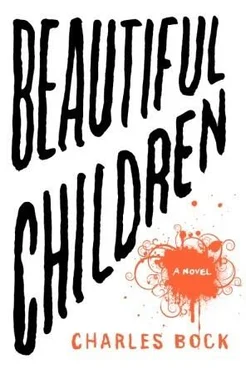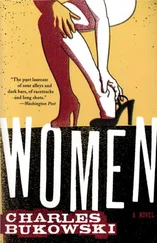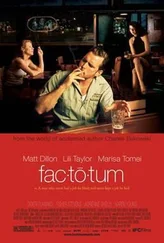The next afternoon she drove to a large shopping center on East Tropicana and entered a small storefront office. Overhead lights hummed, the walls reflected the shade of curdled milk. Lorraine did not catch the name of the harried woman who came up from the back and took her name. After a time, the woman reappeared and guided Lorraine down a short aisle of sloppy, unmanned work cubicles. They sat at a table in the back. Slick posters, done in hard and dramatic colors, hung in cheap frames. The woman offered Lorraine coffee whose quality she apologized for. Mousy brown hair pulled back into a bun, unimpressive olive-green pants suit; early forties or so, Lorraine guessed. With a minimum of small talk the woman asked why Lorraine was there, and kept quiet when Lorraine explained about Newell's case. Every so often, the woman nodded slightly or asked a pointed follow-up. She commiserated and told Lorraine a little about the center and said, as Lorraine could see, they could use all the help they could get. Without any fuss, the woman walked Lorraine through the dos and don'ts of stuffing fund-raising letters into envelopes. “When you get finished, if you're up to it, maybe we'll get you a script and a mailing list. Try you on some calls.”
A lopsided table, weighed down with incoming mail that needed sorting, mailing labels that had to be applied, work that was not important enough for a paid staffer to do, yet needed to be done. Lorraine applied. She sorted. The table was just around the corner from a small room with vending machines and a bathroom, and she bought herself stale pretzels and took breaks to use the facilities. She went through two boxes of stationery and also, for long stretches, stared at the old posters: Van Gogh's Sunflowers reprinted from an exhibit at the L.A. Guggenheim; a primitive crayon drawing of a teddy bear (block letters beneath it conveyed statistics concerning child abuse). She could not avoid a third poster, a teenage boy enveloped in shadows; he was huddled on a stoop, his elbows resting on the knee holes in his jeans, his Mohawked head hanging in his lap. Scrawling red block letters, designed to look like they'd been spray-painted on the wall behind him, read: life on the street is SO glamorous.
Police did not categorize Newell Ewing as a runaway. Nor did they classify him as a victim of kidnapping, nor a possible homicide victim, although they also hadn't eliminated any of these options. He was missing and his case was open and the officer Lorraine dealt with refused to lean one way or another. What had happened to her son was a Rorschach test that revealed the worst inclinations and fears of the person who considered the possibilities. Lorraine herself did not know if she believed her son had run away. She did not necessarily believe that Newell running away from home was preferable to the other choices. But that poster hit somewhere deep inside her. It brought a chill that no mother should experience. So Lorraine returned to the office of the Nevada Child Search the following day. And every day after that. The clock struck two and lunch hour ended and she drove east on Tropicana. And as she sat at that lopsided table and drudged through slush, bits of stories and pieces of information drifted her way: the counselor laughing about the guy who called in, thinking it was a psychic hotline; the disgruntled social worker who could not stop railing against bureaucratic idiocy. At the vending machines, Lorraine talked to a heavyset woman who had the hard, rough demeanor of someone whose life had been spent doing menial and physical labors. The woman told Lorraine about how she'd lived through a tough divorce and had worked up the courage and started dating again, and very slowly had fallen in love, so when her fourteen-year-old daughter claimed the guy followed her into a bathroom at IHOP, this woman had not known how to respond.
And other volunteers: the army mom who came in during mornings — her husband discovered their boy sold drugs and laid down a my way or the highway ultimatum; the grandfather who'd taken in kin as a last option, only to grow tired of calls from the police. Lorraine discovered that about every volunteer she talked with had either lost a child to or been a child of the streets.
She answered their inquiries without a tremor. “I don't know. He went out and didn't come home.”
It was edifying in a strange way, almost empowering, really: the looming posters, the patronizing smiles of office staffers, the grim work of the phone counselors (talking to a worried parent, trying to guide a tweaking street kid). Any other place she went, Lorraine was isolated by grief, stranded on an island. Volunteer work not only eased, but also fed her suffering. Every time she came in, Lorraine politely asked a staffer if Newell had left a message. If anyone matching a description of him had been picked up. And could someone run a check through the police network? She supplied the coffee machine with gourmet blends, brought in expensive doughnuts, and even made a point of remembering each volunteer's favorites. Lorraine went so far as to volunteer for the thankless project of organizing the boxes and files in the back room, and spent hours on her knees amid dusty documents. If any of the tasks she performed could indeed be considered a favorite, then her favorite was reading through the letters and printed e-mails that had come in to the switchboard, picking out inspirational missives, examples that imparted hope, and could be used in fund-raising or informational literature:
Dear Switchboard,
My daughter returned on Tuesday and is back with her counselor. I believe the only reason she came home is because I left a message with you folks and after hearing the message she knew we were here to help, no matter what.
Thank you & God bless.
Dear Nevada Child Search,
I am so glad that the switchboard still exists. I ran away in 1985 and when I was on the streets and living on the run, you helped make things easier. It helped to call the switchboard and get advice. The people I spoke with were never pushy or preachy. They did ask if I was safe, but never tried to tell me what to do. I can honestly say I do not know if I could have survived without the switchboard. It meant so much to be able and call and hear my mother's voice from time to time without having her there to judge or question me. Now that I am a mother myself I know how much it helped her to be able to receive messages from me, too. Thank you so much. Keep up the good work.
Street Teens
c/o: the Nevada Coalition for Homeless Teens
Three years ago my son ran away. For nearly a year I anxiously awaited his calls from many different places in the country, not knowing what to expect from one day to the next. Finally I received a call from him asking for money to come home. I promptly wired him the money. Four days later he called back, saying he'd lost it. It broke my heart to tell my son that I didn't have any more to send, but I did it. I lived in fear of what would happen next and what the next call might bring. A month later I was contacted by your organization saying that my son had contacted you and was on the other line. The counselor not only arranged a bus ticket for him, but also helped develop a plan to assure that the problems which led up to my boy's leaving would be addressed. What the National Runaway Switchboard did was to enable my son to come home at his (and my) hour of need. Please accept this donation. I can never pay for what you gave me, but I can try to help others feel the gratitude I did on that December day when my son arrived home.
The first time Lorraine posted flyers at neighborhood stores, she cried the whole time and was so drained that afterward she promised herself this was it, no way she could do it again. A week later she was at the post office, staring at the ancient postings, children who had been missing from other states for no less than six years. As she waited in line for a clerk, then for an office manager, Lorraine felt assurance in the idea she was indeed doing something larger than herself. Blowing snot into the sleeve of a cashmere sweater, she taped up notices at her son's favorite comic book shop, inside the movie theater he most often frequented, and the pizzeria from the Little League party. On alternate weekends she staffed a table in Caesars Palace's glitzy shopping mall. Crowds passed her little space outside the food court, and their apathy filled Lorraine with righteous outrage, with self-satisfaction, even as it added logs and lighter fluid to the sense of culpability that constantly burned inside her. She grew accustomed to the hollow reverberations of dropped change inside a gallon jug, the leers of bored husbands. What never took was the sight of the teenagers. All those teenagers. Skulking. Effervescent. Awkward. Teenagers in monstrously oversize clothes and floppy hipster beach hats. Teenagers riding the escalator. Hanging out in packs, in pairs, cruising and flirting, laughing, wasting their afternoons like they had all the time in the world. It was too much. Too hard. She did not want to wish they were the ones who had disappeared but fuck help her she did. After her second weekend, Lorraine gave up the table and returned to the back of the old office. When the social workers took to the conference room, or had a junior high assembly to preach to, Lorraine read through three-ring educational binders. Used the wheezing desktops to pore through databases. And what she learned was that more girls ran away from home, 60 percent to 40. That California was the most popular state to run to and from. That call volume to the hotline increased by 50 percent at the beginning of each school year.
Читать дальше











